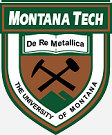Difference between revisions of "More computing resources"
From Montana Tech High Performance Computing
| Line 7: | Line 7: | ||
| − | == CISL == | + | == CISL/NCAR == |
| − | CISL, The Computational and Information Systems Laboratory, | + | CISL, The Computational and Information Systems Laboratory, and NCAR, National Center for Atmospheric Research offer computing resources[https://www2.cisl.ucar.edu/user-support/allocations] to university researchers with some restrictions: |
*The work must be within the atmospheric, climate, and related science | *The work must be within the atmospheric, climate, and related science | ||
| − | *Allocations must either be supported by an NSF reward; or to students and faculty without a | + | *Allocations must either be supported by an NSF reward; or to students and faculty without a award |
Revision as of 14:26, 16 January 2018
XSEDE
Funded by NSF, XSEDE[1] stands for The Extreme Science and Engineering Discovery Environment. Per its website, "XSEDE is a single virtual system that scientists can use to interactively share computing resources, data and expertise."
"The XSEDE ecosystem encompasses a broad portfolio of resources operated by members of the XSEDE Service Provider Forum. These resources include multi-core and many-core high-performance computing (HPC) systems, distributed high-throughput computing (HTC) environments, visualization and data analysis systems, large-memory systems, data storage, and cloud systems. "
If you need additional computing resources, you can apply allocations on the XSEDE systems. Montana Tech has also joined the XSEDE's Campus Champions Program[2]. You can test your project on XSEDE through our campus champion allocation.
CISL/NCAR
CISL, The Computational and Information Systems Laboratory, and NCAR, National Center for Atmospheric Research offer computing resources[3] to university researchers with some restrictions:
- The work must be within the atmospheric, climate, and related science
- Allocations must either be supported by an NSF reward; or to students and faculty without a award
